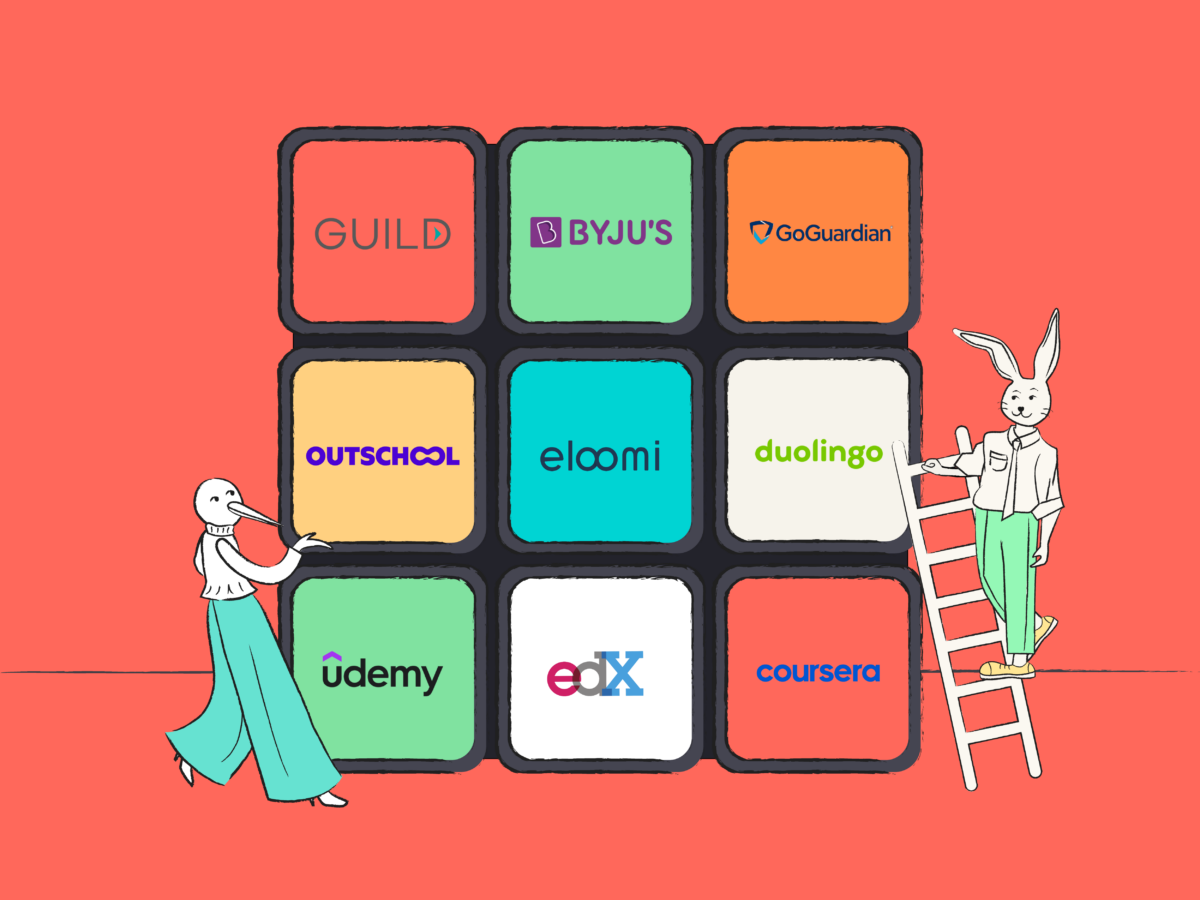Education technology companies, known as EdTechs, are set to improve the learning experience in ways we’ve never seen before. They promise to lessen the burden on teachers, accommodate every learner, and breathe new life into dissatisfied employees.
From 2022 to 2030, the EdTech market is expected to grow annually by 16.5%. When an industry has this much potential, it can be difficult to keep up with. That’s why we’re going to explore the most promising platforms for every need so you can watch them closely.
Top EdTech companies for student learning
Virtual reality (VR) headsets could soon replace the chalk on a blackboard. Entertaining and interactive games engage pupils instead of graffiti-covered textbooks. Research proves learning is generally “more effective” when active, so the change is much-needed.
The classroom hasn’t transformed completely yet. However, with technology advancing at an unbelievable pace, we’re confident it will. EdTech companies allow these new ways of learning to become a global standard because they are affordable and customizable.
Let’s look at the best ones out there and how they appeal to a huge variety of learners.
1. Duolingo
Duolingo is an EdTech company from Pennsylvania that is now based in New York City that focuses on teaching users over 30 languages. You begin by learning simple vocabulary and phrases through daily lessons, ultimately giving you a well-rounded education where you can progress in fluency.
Even if you aren’t familiar with what Duolingo does, you’ll have seen the green owl mascot somewhere across social media. The platform’s character has become a hilarious meme, which is even more of an achievement considering its aim of creating enjoyable education.
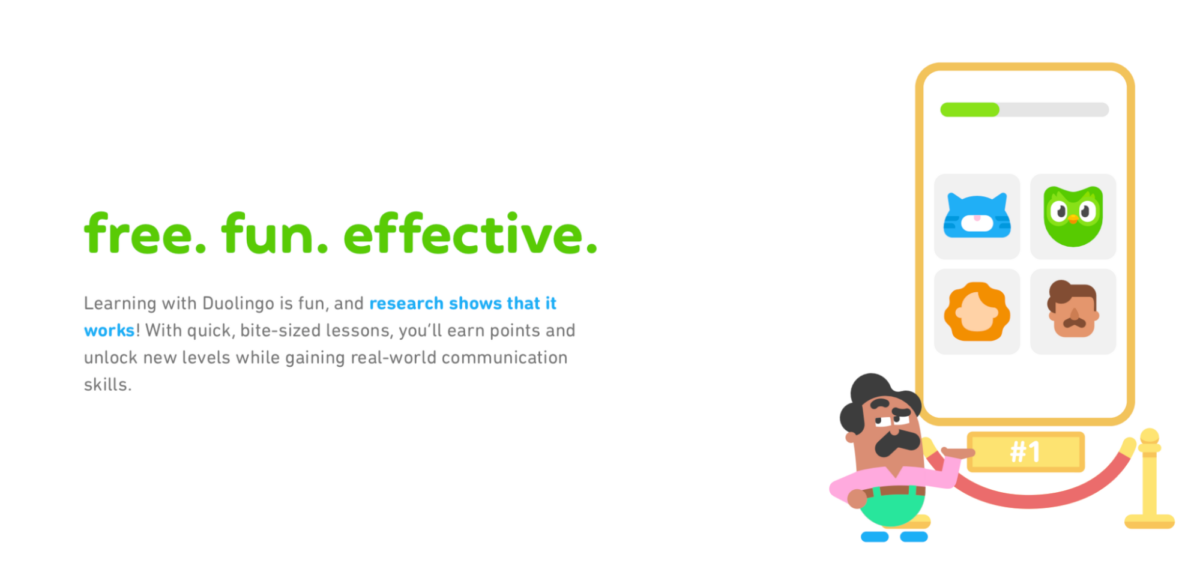
This environment of entertainment is achieved by leveraging gamification. The widely successful brand illustrates that some friendly competition does wonders for retaining information. The numbers back this, too, as an improvement of up to 34% can be seen in student test scores when using this method.
But how does Duolingo do it?
You earn points to unlock new levels as you further your language learning. This format encourages users to compare with peers and boast about their progress. Below are some other useful features that make students more likely to finish their lessons.
- The friendly mascot takes away the stress of learning with encouragement.
- Learning from a mobile device makes it feel more casual than an online course.
- Quick lessons to support shorter attention spans.
- The app offers quirky sentences and fun words because they’re easy to recall.
- Fun challenges help users stay motivated.
- Humor-filled and trendy social media pages disconnect this type of learning from “school” learning, making it more likely students will participate.
The platform has specific applications for educational institutions, businesses, and individuals. The “Duolingo for Schools” version is free for classrooms and follows a standard curriculum. The new way of learning couldn’t be easier to get on board with.
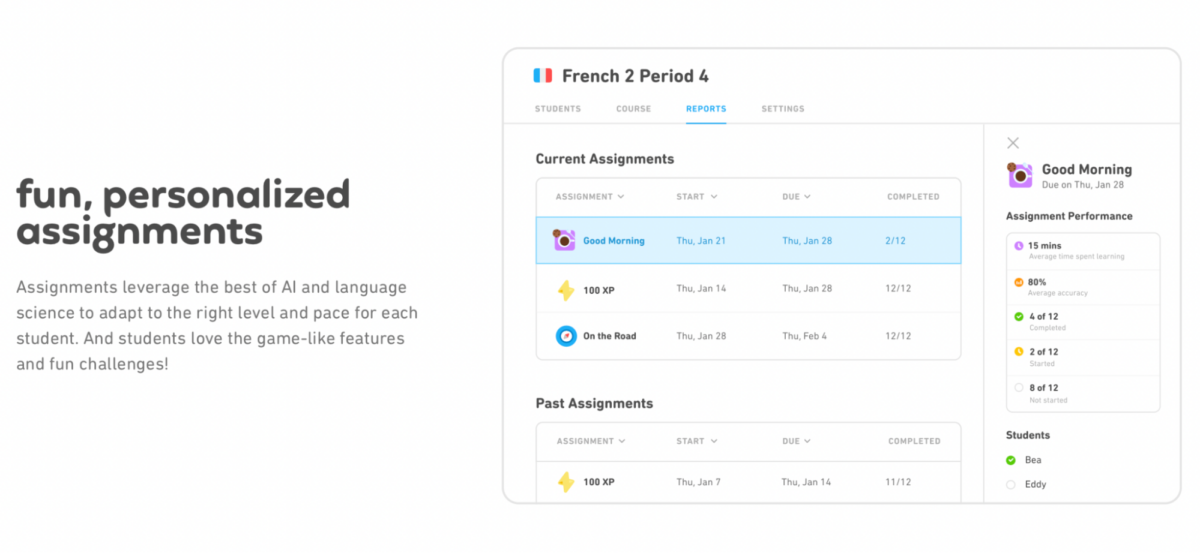
2. BYJU’S
BYJU’S is an EdTech startup from Bangalore created by entrepreneurs. They created this product intending to deliver high-quality educational content. The company employs more than 10,000 people worldwide, including a talented content and research team focusing on revolutionizing the way we learn with new-age methods.
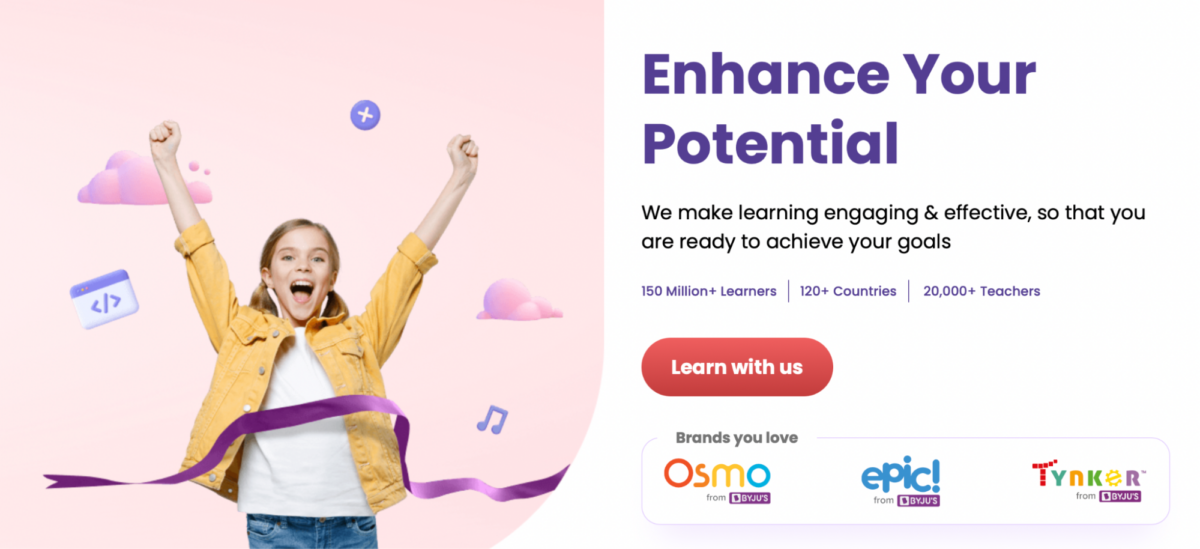
The online learning platform does stick to a traditional curriculum with around 10 subjects. However, it’s the way these are approached that proves the most interesting. For example, BYJU’S recently introduced generative artificial intelligence (AI) models to its process. The algorithms can predict when a student will likely forget a concept and act accordingly.
It’s fascinating stuff, right? Where else has this business been changing the game?
- BYJU’S can be accessed on a mobile app, tablet, laptop, desktop, or TV.
- Movie-like videos and game-like interaction to encourage engagement.
- Two teachers work with a single group, one to teach concepts and another to pay personal attention to the students.
- Digital learning tools and simulations enable BYJU’S to achieve a story-telling approach.
- The speed of videos is much better than our bygone eras, making it more likely that children will stay engaged and stress-free.
- Video lessons are available 24/7 on the app. There’s no need to run between campuses, classrooms, and libraries.
The pricing of the classes will be heavily dependent on the subject, duration of study, and grade. If you’re unsure of where you fit into that, you can take advantage of the many free trials and demos offered by BYJU’S. It’ll be easy for you to find the perfect fit.
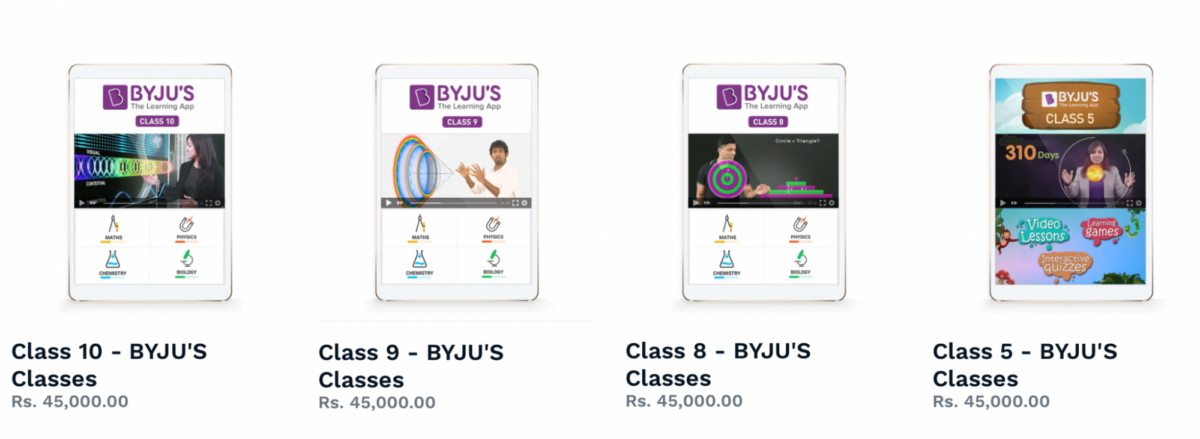
3. Outschool
Outschool is a San Francisco-based EdTech platform founded in 2015 to create innovative and empowering learning environments online. It boomed in popularity as a solution to the global lockdown, which placed students in online classrooms.
The pandemic accelerated changes in education. We were taught many things: children need more motivation than a grade, teaching styles should focus on personalization, and learning should be accessible to all. Outschool works to embrace all of these findings.

On the platform, over 10,000 experienced individuals are trained to handle different topics and educational resources. This scale is unachievable by a parent at home or a teacher in a classroom. This, along with EdTech being an affordable alternative to traditional equipment, means children can take the lead and learn what interests them.
Some lessons follow a conventional curriculum so children won’t miss out on the important stuff. However, users will find many unique choices, such as Minecraft, cybersecurity, or mindfulness, to explore.
Let’s look at what else makes this online education different.
- There are “social clubs” where learners can learn about how community works and even join groups for neurodivergent individuals.
- The quizzes and “escape room” style problem-solving games are available for a wide range of topics.
- Private tutors are available for extra help or a little push.
- There are resources dedicated to both homeschooling and large-scale groups.
- Challenges for topics such as writing, building and reading.
- Art and music classes are designed to encourage individuality and creativity.
Outschool is based on a pay-per-class system, so you only buy what you need. There is no subscription to commit to, and you can stop paying whenever you want. The prices mostly range between $10.00 and $30.00. But some are as budget-friendly as $2.00.
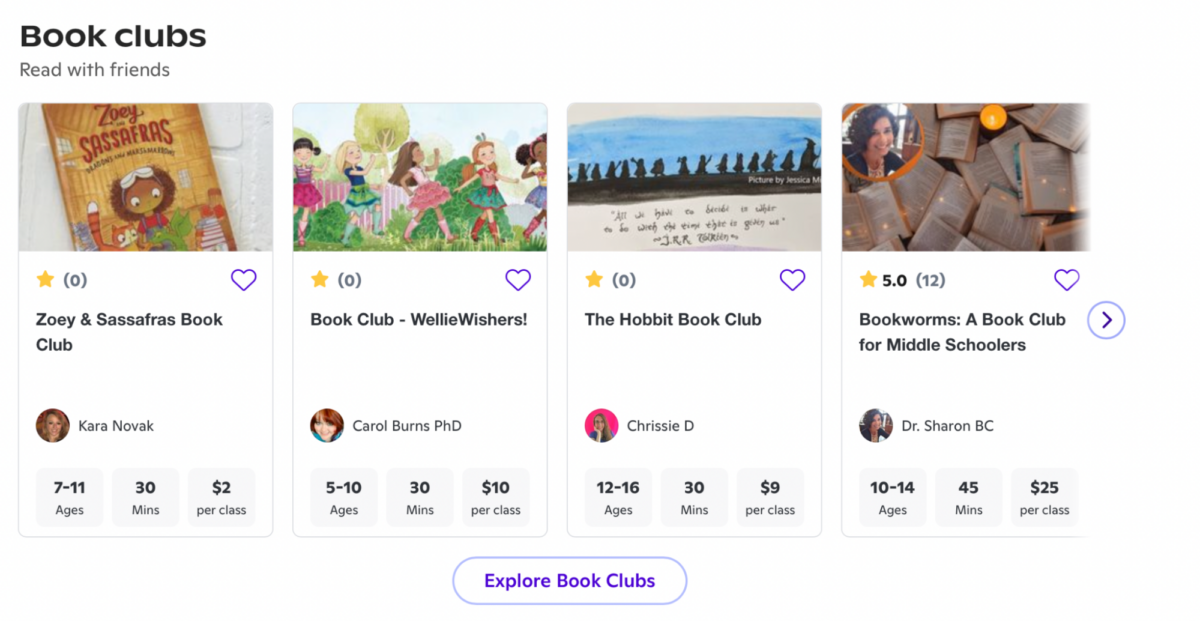
4. GoGuardian
Here at Literal Humans, we know how important the power of the people is. Everyone is a unique individual and should be treated as such. Generic tasks, explanations, and measures of success will hinder many children’s progress.
EdTech enables teachers and parents to focus more on what students need. But Los Angeles company GoGuardian takes this one step further. Every feature is designed to make the learner feel good, support them emotionally, and prioritize their safety.

Learn more about how it achieves this below.
- Beacon’s AI takes the strain from mental health services and identifies at-risk behavior. The response will be in-line with the policy of the school district.
- Many of the tools teachers rely on, such as PowerPoint or Gmail, fit in easily with smart integrations.
- Filters allow students to embrace fun platforms like YouTube but without the distraction of unhelpful or harmful content.
- The instructions for assessments and tasks can be adjusted to meet specific needs.
- The Live Class Board has various options to help students engage. They can contribute by drawing, adding text, or answering multiple-choice questions.
- A built-in social-emotional learning (SEL) check to keep track of children’s well-being and easily offer positive feedback when you think they need it most.
Once you complete your trial, which we always recommend doing for clarity, you can ask for a quote from the organization. They will then get back to you with offers, payment plans, and anything else you could need to know.
Top EdTech companies for employee upskilling
An educated workforce is no longer just an aspiration; it is a necessity. Considering 74% of employees are willing to learn new skills or re-train, there’s no reason for employers not to invest. It’s even easier when many platforms are tailored specifically to your needs.
A boring team meeting scheduled moments before home time isn’t the way to spark motivation. The training documents conjured up decades ago by someone who isn’t even employed anymore are unlikely to generate any bright, innovative ideas.
Here are the best EdTech companies revolutionizing digital learning for career fulfillment.
1. Guild Education
Guild is a Denver-based public benefit and online tutoring organization for businesses. EdTech focuses its attention on addressing two problems: employees feeling stuck in their positions without growth and employers failing to find hires with the right skill sets.

The company works with the idea that these issues solve themselves when everyone has rightful access to education. Busy people can learn at their own pace and choose from short-form courses or degrees. This flexibility means that workflow is never sacrificed, and no one is left out due to other commitments or time restraints.
Let’s explore the other reasons why Guild makes education simple.
-
- Upskilling lessons based on predicted future demands, such as coding, data science, and AI.
- 1-1 career coaching so team members can figure out their paths and goals. This facilitates smoother mobility.
- Vetted partners are chosen because they are passionate about what they teach and want to help achieve the most positive outcomes.
- Tuition-free. The partnerships are directly between the employer and educator, so employees don’t have to worry about the costs.
- There are programs to suit every circumstance. Team members can choose from boot camps, higher education or high school degrees, and certificates.
- Employees can explore open positions in their company, meaning the skills they learn will make them a perfect fit.
Guild removes a financial barrier that causes many individuals not to chase their dreams. An employer would need to book a demo with the organization to find out how much they’d need to pay and what tuition assistance is available.
2. Udemy
Another EdTech from San Francisco is Udemy, which has since made itself at home in New York. With more than 12,00 businesses using its resources, it’s safe to say this is one of the largest education companies out there. Real-world experts are on-hand to help all organizations discover their team’s potential.

There are many reasons why this business is trusted by so many learners, such as its affordability. But it is the diversity of courses we think you should know about. More than 200,000 courses are available, and 600 will be free. To add to the excitement, new masterclasses are added every month and are on demand.
Here are some other ways Udemy shakes up the learning process.
- Some topics are more professional, such as machine learning or copywriting. However, the courses on happiness, spiritual healing, and stress reduction are fantastic mental health resources.
- The capacity to learn skills such as graphic design and Photoshop may help individuals progress in new directions.
- Lifetime access to a course you’ve purchased, so skill decay won’t be an issue.
- Paid courses grant you a certificate once you’ve completed it, so employers can keep track of who’s learning what, and employees get a sense of achievement.
- The platform is user-friendly and easy to navigate, which makes it accessible for even the least tech-savvy team members. You’ll also find subtitles in a range of languages so everyone can be included.
- Up-to-date information on topics like computer science so employees can learn about groundbreaking technology as it advances.
Udemy has a specific version for businesses. The “Team” subscription costs $360 per user per year and supports 5-20 total employees. The “Enterprise” upgrade works better for any number above 21 but you’ll need to contact sales for a valuation. If you’re a registered 501(c)3 nonprofit organization, you can discuss separate plans, which is a nice touch.
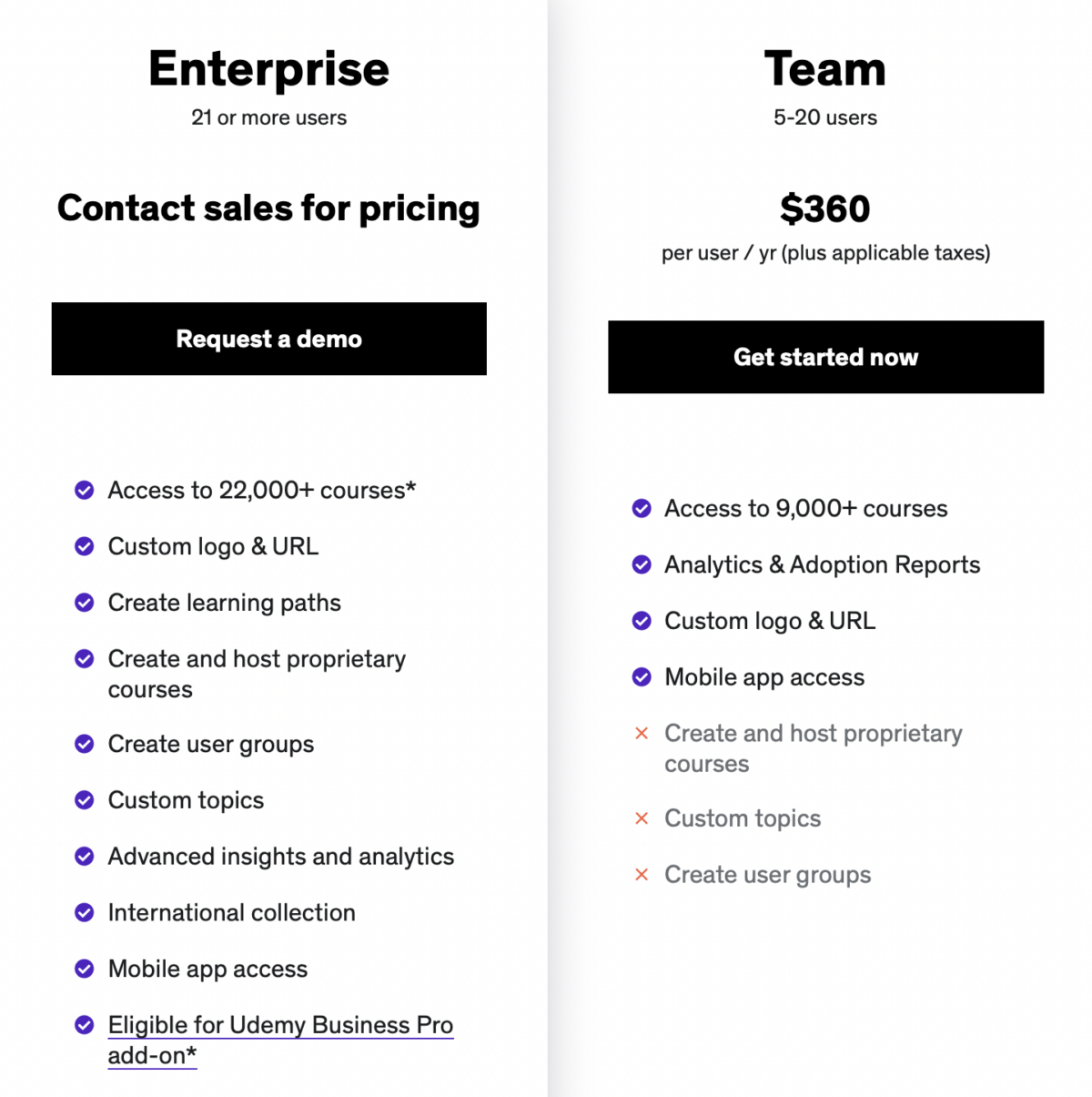
3. Coursera
This next EdTech is California-born Coursera. It was founded in 2012 by computer science professors. The mission was simple: bring the best possible learning practice to every corner of the world. Businesses don’t have to rely on their limited resources anymore.

One of the best things about this platform is the certificates awarded are professionally recognized. Also, the degrees earned come from world-class and highly-regarded companies or universities. When learning feels rewarding, performance improves tenfold.
Below are some of the ways Coursera inspires its learners.
- Role-based assessments and intelligent metrics help to identify critical skill gaps and advancement opportunities.
- Both team member and employer-specific courses gel everyone together and create a cohesive workforce.
- Immersive learning makes it much easier to retain and apply information.
- Easily retrain an employee whose role is affected by emerging technologies or new equipment with pre-prepared training.
- Lower training costs than traditional approaches without compromising on flexibility or quality.
- The structure of the online courses varies, so if something doesn’t work, you can try something different and get a better outcome.
For business customers, there are two plans available. The “Team” option can be utilized with between 5-125 users, making it very scalable. This comes at an annual cost of $399.00 per person. The “Enterprise” upgrade is more mysterious and will require a conversation with a sales team. We do know it can handle more than 125 members.

4. eloomi
The EdTech eloomi launched in 2015 in Copenhagen. The company has since built foundations in London and Orlando, spreading the word across the globe that education should be simple but effective. Besides invaluable learning resources, this is executed through features like knowledge banks, communities, and live support.
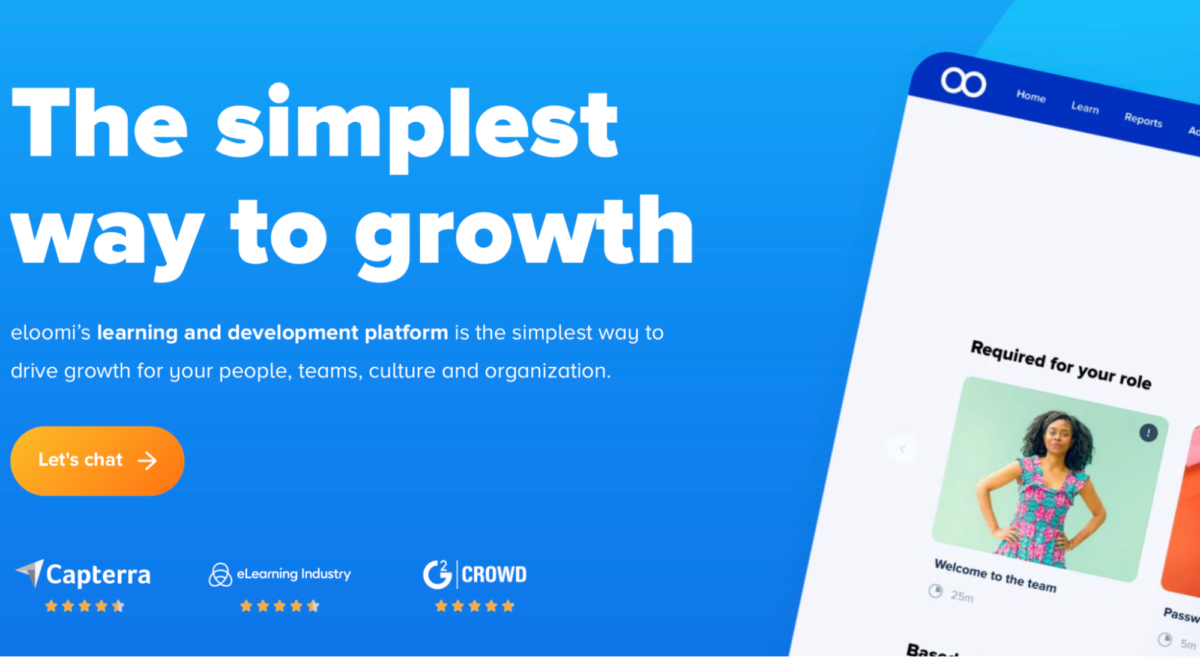
The company is trusted by thousands of businesses. We’re sure you’ll know some of the big brands, like the delicious Domino’s. It’s clear to see why these customers keep coming back. The software is fun, easy to use, and scalable. From advanced knowledge to foundation training, it’s got you covered, no matter how big your needs grow.
Shall we take a look at how eloomi makes it happen?
- Keep track of the skills your employees want to learn and discover promotion or training opportunities.
- Automated suggestions for relevant learning make it possible to close more skill gaps and encourage team members to further their growth.
- Courses can adapt depending on whether teams are hybrid or remote workers.
- Build unique content tailored to your goals with the intuitive course builder.
- The Content Store holds carefully curated lessons and resources, so you know your team is only accessing the very best, accurate, and fresh information.
- Native integrations boost productivity and save you time by automating tasks.
There’s no way to determine how much you’ll be paying without requesting a quote from the organization. However, doing so will ensure you get the best price for your personal needs. So, we’d say it’s worth doing.
Honorable mentions
While we have already covered 8 truly inspiring EdTech companies, the list of innovative brands making their mark on the education industry is overwhelming. They prove more software-as-a-service (SaaS) platforms are attempting to steer users away from traditional learning. It wouldn’t be fair not to mention them, considering the good work they do.
From product management tools that give the user control to resources that ease the burden with carefully curated content, here are some of our other honorable mentions. We recommend looking at a variety to better understand the education revolution. They all do something different, but also all enhance learning with bright ideas and care.
Knowledge is power
Learning doesn’t stop once we complete our high school exams. It plays a crucial role in every stage of our lives, especially in the development of our careers. As such, we should never stop trying to improve the process. That’s exactly the aim of EdTech companies.
Whether you’re a parent, teacher, or business owner, leveraging these education platforms will unlock many benefits. Not only will you reap the rewards personally, but you’ll change the learning process for good. There’s never been a more exciting time to start than now.

